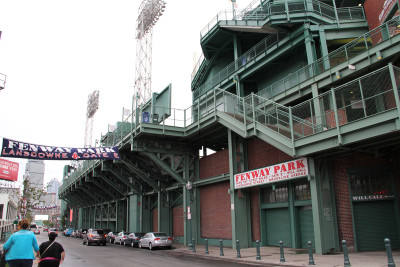
Massachusetts Inspector General Glenn Cunha criticized a 2013 deal by Boston Redevelopment Authority that granted the Boston Red Sox ownership of Yawkey Way and Lansdowne Street, in a letter dated Monday.
The deal allows the Red Sox to use Yawkey Way to sell concessions on game days and grants use of air space over Lansdowne Street to build more seating on the Green Monster scoreboard on the left field wall at Fenway Park.
“The review found that the BRA did not exercise the due diligence it owes to the City and the taxpayers,” Cunha wrote to BRA Director Brian Golden. “It failed to ensure that the sale price it negotiated was in the taxpayers’ best interest. Furthermore, its process for reviewing and approving the transactions was flawed, not supported by evidence and lacked transparency.”
The $7.34 million sale was not “revenue-based,” Cunha wrote, and therefore not beneficial to taxpayers.
In the letter, Cunha called on the BRA to implement better policies and procedures for project plans including “industry-standard appraisals” to ensure high revenue for taxpayers and an “open and transparent process.”
Jack Meyers, a spokesman from the Inspector General’s office, commented on the speed of the deal.
“The BRA board was only given information about the terms of the transactions a few hours before the board vote, and that’s not enough time to make an informed judgment about whether this is good for the citizens of Boston,” Meyers said.
Yawkey Way and Lansdowne Street are public properties owned by the city, Meyers said, and therefore they belong to Massachusetts residents.
“To sell these properties to a private party is to short-change the public for its property,” Meyers said.
Golden said the BRA fully cooperated with the Inspector General’s Office and that the current leadership finds the process that led to the deal “deeply flawed.”
“There are always lessons to be learned from past mistakes, and we are committed to adopting a policy and procedures that better govern the BRA’s use of demonstration project plans going forward,” Golden said in a Monday statement. “We value the Inspector General’s thoughtful recommendations on this issue and look forward to enhancing our protocols.”
The Red Sox acknowledged the report, but clarified that the transactions were “fully supported” by appraisers and were “lawful and entirely appropriate.”
“If anything, the price that the Red Sox paid for street use and air rights and for the limited use of a street is much higher than what other private parties had previously paid for air rights or for street use,” the team said in a Monday statement. “The Red Sox ultimately agreed to the final terms very reluctantly.”
Randall Ellis, a professor of economics in Boston University’s College of Arts and Sciences, said it is beneficial for the Red Sox to own Yawkey Way.
“It is desirable to let the Red Sox and Fenway reconfigure this area to best manage the concessions,” Ellis wrote in an email. “Overall, it would probably a plus for Red Sox fans attending games.”
Despite the fact that he is a Red Sox fan, Ellis said he agrees with the Inspector General.
“The deal was definitely rushed,” Randall said. “It reflects political maneuvering to give the Red Sox a good deal.”
Ellis said even if there is an impact to commerce at Fenway Park, it is probably “less than a dollar per resident.”
“There are a few businesses on Lansdowne and Yawkey Way or in the area [that] might be worse off,” he said. “I know you can buy nicer food at the restaurant on Yawkey Way than in the stadium, [but] probably not if that road were open to the public.”
Several residents said they were concerned about how Red Sox ownership of Yawkey Way will affect traffic and the daily commute.
Ana Maria Leguizamon, 20, of Back Bay, recently moved from Colombia and has heard about the infamous crowds from Red Sox games.
“If they close off streets for game days, I think it would affect my neighborhood for sure,” she said. “I’ve heard that when the Red Sox play, people get crazy.”
Keisha Ward, 25, of Brighton, said she is concerned about the effects of closing down Yawkey Way for game days.
“I go to school at Wheelock [University], which is right by Fenway,” she said, “so if they close off areas, that would not be good for my commute.”




